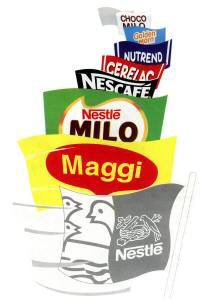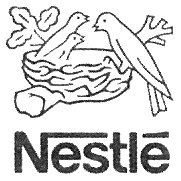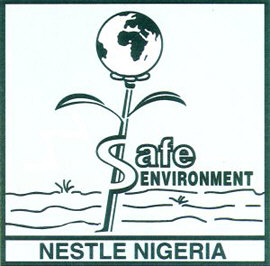
|

|
 |
 NIGERIA
NIGERIA
A new business climate |


Read our exclusive interview
|

 NESTLE NESTLE
Manager:
Managing Director & Chief Executive
Jean-Louis Chaumeil
Contact:
Nestle Foods nigeria Plc.
20624 Industrial Avenue
Ilupeju
PMB 21164, Ikeja
nigeria
Telephone + 234 1 497-8720/4 (5 lines)
Facsimile +234 1 2645590
Public Relations Samuel Adenekan
Manager
Telephone + 234 1 497-8720/4 (Ext. 312)
Corporate Website : http://www.nestle.com.ng
|
 Strategy Strategy
 Message from the Managing Director and Chief Executive of Nestle Foods nigeria PLC Message from the Managing Director and Chief Executive of Nestle Foods nigeria PLC
The issue of environmental protection and conservation of natural resources has become of primary concern to the human race in the last few decades.
It has been realised that man’s continued survival on this planet will increasingly depend on his ability to maintain a balanced ecosystem and a sustained resource base to the overall benefit of both present and future generations.
In some parts of the world, much progress has been made towards the protection of the environment and preservation of natural resources. However, much still remains to be done, particularly in developing countries, including nigeria.
Nestle nigeria is pleased to be associated with a global business organisation, Nestle S.A. of Switzerland, which considers the preservation of the environment as an integral component of its business philosophy. Thus, we in Nestle nigeria share the worldwide commitment of Nestle S.A. to environmentally sound business practices.
Our primary vocation is the transformation of perishable agricultural raw materials into high quality food products, which serve the needs of the consumer as well as satisfy his or her desire for convenience.
Therefore, preservation of the environment from which we derive our man raw materials is of primary concern to us. We are equally conscious of the fact that packaging, vital as it is for ensuring the safety and quality of our products, needs to be given adequate consideration under the aspects of solid waste management.
The Nestle nigeria Policy on the Environment, is an adaptation of the Nestle’s worldwide Policy on the Environment with specific focus on the peculiar local environmental issues, it highlights the various systematic measures and programmes we have adopted in our operations which specifically illustrate our overall concern for the environment.
The Nestle nigeria Policy on the Environment, also describes the various measures recommended by Nestle S.A. of Switzerland and provides information to the relevant authorities, institutions and other interested parties.
With the collaborative efforts among the authorities, industries and professional groups, sustainable environment can be attained.
MR. JEAN-LOUIS CHAUMEIL
Managing Director & Chief Executive
 The Nestlé nigeria Policy on the Environment The Nestlé nigeria Policy on the Environment

Nestlé nigeria , in line with the Nestlé World-wide policy, is committed to environmentally sound business practices.
Our business activities in nigeria take into consideration the need to comply with the relevant local laws and regulations on environmental protection and sustainable development of natural resources
It is our policy to take local legal requirements as a minimum, but in the absence of any local laws, we apply internal Nestle’s world-wide rules and guidelines that often stricter
We strive always to minimise the impact of our operations on the environment through the utilisation of packaging and manufacturing processes that are internationally recognised to have minimum impact in the environment
The management and staff of Nestlé nigeria as well as the suppliers and customers are encouraged to show interest in matters relating to the protection of the environment and conservation of our natural resources.
 INTERVIEW WITH INTERVIEW WITH
MR.J.L.CHAUMEIL
MANAGING DIRECTOR AND CHIEF EXECUTIVE OF NESTLE FOODS
July 16th, 1999
1. Nestle started operations in 1961 as a simple trading organization, today you are one of the leading food manufacturing companies. Could you give us historical background of Nestle Foods in nigeria?
1961: Formal presence in nigeria as a branch of Nestle Products (Nig.) Limited.
1969: Incorporation as a private company: Food Specialties (Nig.) Ltd. (FSN).
1971: Small Factory established at Ilupeju for pressing and wrapping MAGGI cubes.
1978: FSN became a public company, quoted on the nigerian Stock Exchange
1982: Agbara Factory and Otta Distribution Centre Commissioned.
1991: Change corporate name to Nestle Foods nigeria PLC
1992 to 1993: Launched new products such as CERELAC,CHOCOLATE, MAGGI CRAYFISH, MAGGI CHICKEN and re-introduced NESCAFE Instant Coffee.
1995: Commissioned a new food processing Factory at Agbara to produce Enzymatic Hydrolyzed Protein Mix
Nestle Foods received 1995 MILO Best Performance Award for the best achiever in sales/volume growth and profit improvement of MILO food drink in Africa and the Middle East.
1996: Scheme of Arrangement merging Nestle Foods nigeria PLC (NFN) with Nestle nigeria Limited (NNL) concluded – NNL becomes wholly subsidiary of NFN.
2. Sticking to Nestle for now, could you give us a brief idea of the company in terms of the size of the company and in terms of growth?
Nestle nigeria employs about 1,200 people. Of this number, 1000 people work in the factory, the rest is split between Ilupeju head office and Otta Distribution Centre.
Our products are distributed and sold across six regions: Lagos Area, South West, South East, North West, North East and the Federal Capital Territory, Abuja.
Although our distribution system ensures the widest penetration into the nation’s markets at a pan nigerian price, still have room for improvement in the northern region of nigeria. Our turnover last year (1998) was over six billion Naira and project that we shall be able to hit over seven billion Naira this year (1999).
Market share?
It depends on the product category. For example in the infant cereals weaning food, (such as NUTREND, CERELAC MAIZE and CHOCOLATE) we command 90 per cent market share. In the Beverage group (such as MILO food drink) our estimated market share is about 30 per cent, where we are in competition with Cadbury ’s BOURNVITA.
In the culinary category, our MAGGI range of seasonings command between 55 to 60 per cent market share. Our solid kitchen seasoning, MAGGI Cube is the generic name for almost all seasonings in nigeria because we are the first to penetrate the nigerian market.
In terms of management, it said that Nestle International Corporation could be more actively involved in the management of the company?
No, I don’t think so. The change in local management does not necessitate that Nestle nigeria will be run from our international headquarters in Vevey, Switzerland. Given the global setting of Nestle which operates in 81 countries of the world, you are likely to apply the management strategy of "global thinking and local action" concept. For example, the total number of Nestle factories worldwide as at the end of 1998 was 522 in 81 countries of the world. It will be inconceivable for Nestle to run all the 522 factories scattered in 81 countries of the world from Switzerland. Thus Nestle allows the operating companies exercise a large degree of autonomy due to the decentralized organization of the Group. On the basis of a global strategy decided by the Group, each subsidiary puts forward its plan of action. It manages and develops its business with the main objective of offering the consumer a vast range of quality products suited to his needs.
If you compare Nestle nigeria with other African Nestle operation, we are number three, after South Africa, Egypt and Cote d’Ivoire you can see therefore that its possible for nigeria to be the gateway to the economy of countries in Western and Central Africa region. No doubt, other countries in Africa need nigeria to power their engine of growth and pull their economy up.
Are you planning to operate internationally from nigeria?
Or as a platform in western countries?
You know, everybody wants to export, nigeria is a big country with vast human and natural resources. We have first to supply nigeria. Of course we believe that nigeria is the gateway to the economy of other countries in Africa. Thus we shall continue to operate in nigeria because we have the key success factors: our products are high quality products, and they have acceptable perceived value and appropriate price as well. Don’t forget that the purchasing power is quite low. The price of the product must be in line with consumer expectation. The nigerian market is very huge for instance, we sell about 12 million maggi cubes daily. Milo is doing very well also.
|
I guess you are planning to increase this figure?
Of course it’s our duty for the benefit of our people, shareholders, business partners and of course of our consumer. We shall increase the volume in future if the market expands. We also assist our big distributors to sell the products through the sales representatives.
Distribution remains the main focus of your strategy?
You cannot expect to grow if your products are not available. Distribution and service are key factors keeping in mind our consumers expectations.
Is it a problem of low penetration or distribution, in this part of the country, or how people perceive your products?
In the past, we used to have allocation system for our distributors. But today with free-ordering you may have the warehouses of our distributors full of Nestle products (and competitors’ products as well) waiting for buyers. Distributors have not yet fully understood that times are changing and we have to help them to push out the products to the final consumers in line with one of the strategic pillars of Nestle: to have our products wherever, whenever, and however.
You mentioned the word "Competition" I guess in this market one needs to mention Cadbury which is your competitor?
Yes, we respect them very much.

Could we talk about a favorable competitive environment?
Yes, among the key players in food and beverage sector in nigeria, you have Cadbury, Nestle, Unilever and so on. I think it’s a fair competition. The sun is shining for everyone. The consumer is the king and the ultimate choice lies with him.
What are your best assets to compete?
Our key assets are people, products, brands technical know-how, research and development. In fact Nestle spends over 700 million CHF on Research and Development per year. This allows Nestle to be constantly at the cutting edge of development and to offer consumers in the more than hundred countries where our products are marketed, healthy, tasty and varied high-quality food which also suits the different traditions and tastes in each of these countries. Nestle nigeria is benefiting from this policies.
I like your expression. "The sun is shining for everybody", but Nestle is in the basic consumer product industry. Are you planning to move into the general food brand of products to increase your market share in nigeria? Is it part of your strategy to move into the general food and are you planning to bring in more international brands, and diversify your products?
Yes definitely, we shall bring in more new products I hope your magazine, Forbes will help to show case the favorable investment climate in nigeria. Experts are considering nigeria as a country with high political risk, but they are forgetting the high potential in business opportunities.
Although the economic environment in nigeria in the second half of 1998 was characterized by a general slow down in economic activities, the coming to power of President Olusegun Obasanjo has reflated the business hope. The president has listed eighteen major issues that would be addressed by his administration to bring back the economy on sound footing. He appears to be doing well on policies aimed at resuscitating the manufacturing industries and on macro-economic policies. The President’s resolve to promote, in close co-operation with other members of the organized private sector, (ops) and other stakeholders in the economy, an enabling environment for industrial development, growth and prosperity of the society at large will see nigeria emerging an industrial giant in Africa.
So perceptions are changing now?
Yes perceptions are changing fast. We owe it a duty to tell the outside world of the abundant opportunities and potentials available in nigeria.
But anyway, you can feel the changes over the last few months?
Yes, the general social tension is reduced in the street. The advent of democratic dispensation in nigeria has ushered in freedom of speech, and freedom of association in nigeria. This was not the situation some months ago. On the other hand, expectations from people are higher.
Getting back to what you raised, that is the low purchasing power. How does it affect your business and how do you see the situation in 2 years?
The low purchasing power of nigerians is a reality that we have to face. But if you say 10 per cent of nigerians have a sizeable purchasing power, in a country of 120 million people, it represents 12 million people which is twice that of Switzerland.
It’s not bad, but we’re talking about 120 million people.
Not everyone of the 120 million can have access to our products which are relatively expensive, considering the purchasing power nevertheless we have products in small packs which can cater for the low income earners.
How do you see handling the situation in 2 years.
We had the elections, sometime in February/March, and we are still undergoing changes in the economy and we felt it straight in our sales, which has increased. When I listened to President Obasanjo saying that minimum wage will be =N=6,000 for the public sector from 1-1-2000, I was very happy. Definitely some of this money will be used to purchase food items, which will, in turn boost our sales.
Lets have your personal opinion on how confident, you’ll be towards the years in nigeria?
nigeria’s economy will be buoyant in the coming years: infrastructure facilities, telecommunication etc will be improved, and there will, hopefully in the social economic status, a virile and thriving middle class, which have been wiped out. Nevertheless, the government still needs to improve on the infrastructure facilities which are not functioning quite well for now.
You talked about infrastructure, as a main problem of nigeria is global infrastructure problems. You mentioned bridges, road, electricity …..
You have a tremendous good road network in the North , but in the West and Lagos the roads are not so good which is not helping the distribution. Another example is telecommunications, which needs to be improved upon. Although it appears there is noticeable improvement in the telecommunication in recent times. During a market visit to the North East I was able to reach by phone and fax Lagos and our other regional offices.
You’re a very positive person.
Or lucky may be, if you speak security everybody is afraid. In South Africa you have the same problem of security but investors are living with it. Of course, we have to be very cautious and I hope Government will come up with solution to improve the situation.
You’re indeed very positive.
Well, I am being realistic. Our factory located at Agbara; a huge complex is enjoying an acceptable supply of electricity from the National Electric Power Authority (NEPA).
More positively, can you say that nigeria needs more investors for all the sector?
As I said before, nigeria is blessed with vast natural resources not yet exploited. For example, I was in Jos, northern region of nigeria recently, I was amazed to see the quality of the soil, in Jos, Plateau State, black earth soil, you could feel its richness. Unfortunately, nigeria has not fully exploited the potentials of this soil. For example, why not inviting Tanzanian, South Africans, Egyptians, who are strong in agriculture, to assist nigeria, such that this area can become the food basket of the region.
You are one of the star performers on the nigerian Stock Exchange (NSE). The stock exchange is under-developed in nigeria. How do you see the future of the stock exchange?
I think the stock exchange is taking the right direction. I guess it will grow proportionately with the economy. If you compare Cote de Ivoire Stock Exchange with the nigerian Stock Exchange, there are still a lot of room for improvement for the NSE. I wish to commend the Automated Trading System, ATS, which has enhanced the computerization of stock market in nigeria. It will make the transactions much more transparent.
Last question, you’ve been working with Nestle for 20 years, you were in Egypt, Dubai and nigeria,. Could you give us your personal background briefly?
terest for Forbes readers but at least I can say that I’m proud working for Nestle, it has given me the opportunity to learn not only products but people and different cultures, to notice similarities between countries (Egypt and nigeria). If you compare Lagos and Cairo you can see 2 megapoles with traffic jams and so on. But not only this. In 1992, Egypt decided to embark strongly on privatization and I am happy to see nigeria taking the same way but again the expectations have to be moderate. Privatization can be a long process. Don’t expect it can be done in one year.
Can you give us a last comment for the readers?
That Forbes has two 2 nice representatives in nigeria and it seems they are surviving very nicely.
Very nicely. No messages to come from nigeria?
You know if I have money and don’t know how to spend it I will come to nigeria, and invest in agriculture, fishing, and tourism !
|
© World INvestment NEws, 1999.
This is the electronic edition of the special country report on nigeria published in FORBES Magazine,
October 18 th issue.
Developed by AgenciaE.Tv |
|
|
|
|
|
|
|
|
|
|
|

